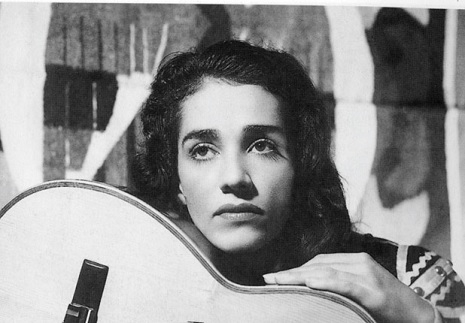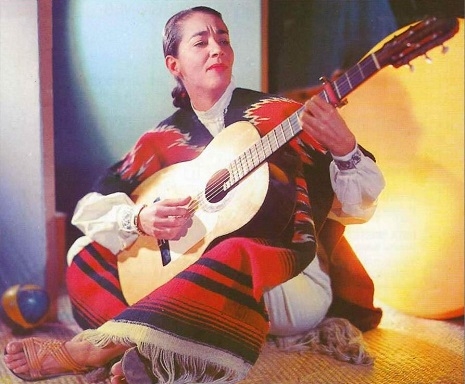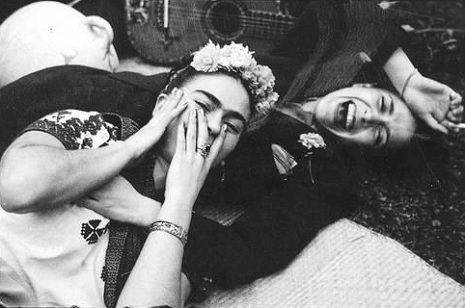
An early photo of Vargas, focusing on her beautiful face, and cropping out whatever masculine clothes she might have been wearing at the time.
A word of comfort to non-Spanish speakers: Mexican toddlers have a stronger command of the language than I do, but the first time I heard Chavela Vargas’ “Paloma Negra,” I knew exactly what she was saying. There are some artists that convey such an intense pathos without the benefit of a common language, even attempting to write about them leaves one feeling a little hackneyed, but I’ll do my best.
Chavela Vargas was born Isabel Vargas Lizano in Costa Rica in 1919. In the midst of an unstable childhood, she moved to Mexico at the tender ago of 14 to pursue a singing career in the burgeoning Mexican arts scene. For years she busked, wearing men’s clothing and smoking cigars. She carried a gun and embodied the machismo of her artistic idiom. Though she covered quite a bit of ground stylistically, Vargas was mainly known for her rancheras- traditional Mexican music performed with a single voice and Spanish guitar. Rancheras are often mournful torch songs sung by drunken men; alcohol provided a socially acceptable loophole for Mexican machismo to be shrugged aside for emotional and vulnerable performances. On the more rare occasion that rancheras were performed by women, gender pronouns were obviously switched to keep everything tidily heterosexual. Vargas simply sang to the girls.

Vargas in full poncho
It wasn’t until her 30s that her career began to flourish, kick-started by a brief but successful visit to pre-Castro Cuba. By the time she became popular in Mexico, she was as much known for her bombastic persona and unapologetic sexuality as she was for her powerful voice and intense performances. She would come to shows on motorcycles, smoke cigars onstage, imbibe heavily, and openly flirt with men’s wives during performances (many swear she took a few home with her). All of this was during a time when even wearing pants was scandalous behavior for a woman in Mexico. While she had a rich sense of humor, one of her stylistic trademarks was slowing down cheeky tunes, transforming what were originally dirty little ditties into something intensely erotic. The scandals cost her a lot of work, but Vargas had no interest in catering to anyone’s notion of respectability.
Much of her life is shrouded in rumor and half-truths. It’s said that Vargas walked with a limp due to an injury incurred while attempting to climb in the second story window of an ex-lover. (Given Vargas’ difficulties with alcoholism, this isn’t particularly difficult to believe.) It’s known that she was incredibly close to Frida Kahlo, even living with her and her husband, Diego Rivera, for a time. I’ve never found absolute confirmation that they were lovers, but it’s largely accepted as fact by fans of both artists. Vargas even made an appearance in the 2002 Frida Kahlo biopic, singing a ghostly version of one of her signature songs, “”La Llorona,” (“The Weeping Woman”). I urge you to listen to both versions back to back; Vargas’ age and alcoholism seasoned her voice with a quality I can only describe as post-beautiful.
While Vargas’ career was fraught with ups and downs, she virtually disappeared for about 15 years starting in the late 70s. Intense depression and alcoholism finally sent her into a long seclusion, but in 1991 she returned to the stage, happy, healthy and transformed. With her famed trademark innuendo, the 74-year-old butch lesbian declared her never-ending commitment to music at a concert in Madrid, saying, “When you like something, you should do it all night long.” She officially came out in 2000, at age 81, and played Carnegie Hall three years later. She continued singing and recording up until her death in 2012, at age 93.

Vargas and Frida Kahlo
Below is some rare early footage of Vargas performing her famous rendition of “Macorina,” a poem that she set to music of her own composition. During the refrain, “Put your hand here, Macorina,” Vargas’ own hand would wander between her thighs. It was her first hit, and it was originally banned in Mexico, a country that now reveres here as one of its great daughters. The lyrics:
Put your hand here, Macorina
Put your hand here.
Put your hand here, Macorina
Put your hand here.Your feet left the mat
And your skirt escaped
Seeking the boundary
On seeing your slender waist
The sugar canes threw
Themselves down along the way
For you to grind
As if you were a mill.
Put your hand ...Your breasts, soursop fruit
Your mouth a blessing
Of ripe guanabana
And your slender waist
Was the same as that dance
Put your hand ...Then the dawn
That takes you from my arms
And I not knowing what to do
With that woman scent
Like mango and new cane
With which you filled me at
The hot sound of that dance.
Put your hand ...





